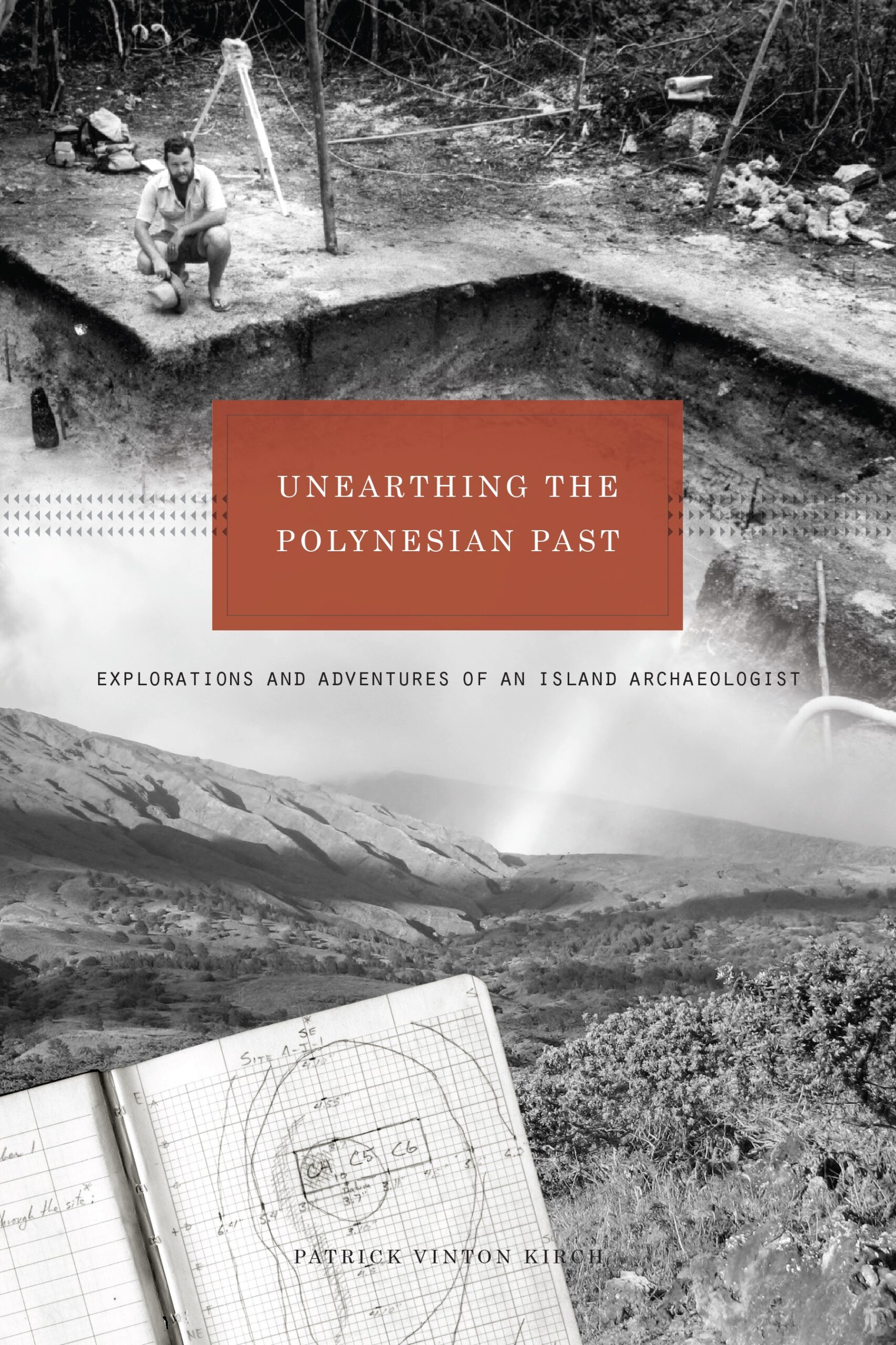Unearthing the Polynesian Past: Explorations and Adventures of an Island Archaeologist
- About the Book
-
Perhaps no scholar has done more to reveal the ancient history of Polynesia than noted archaeologist Patrick Vinton Kirch. For close to fifty years he explored the Pacific, as his work took him to more than two dozen islands spread across the ocean, from Mussau to Hawai’i to Easter Island. In this lively memoir, rich with personal—and often amusing—anecdotes, Kirch relates his many adventures while doing fieldwork on remote islands.
At the age of thirteen, Kirch was accepted as a summer intern by the eccentric Bishop Museum zoologist Yoshio Kondo and was soon participating in archaeological digs on the islands of Hawai’i and Maui. He continued to apprentice with Kondo during his high school years at Punahou, and after obtaining his anthropology degree from the University of Pennsylvania, Kirch joined a Bishop Museum expedition to Anuta Island, where a traditional Polynesian culture still flourished. His appetite whetted by these adventures, Kirch went on to obtain his doctorate at Yale University with a study of the traditional irrigation-based chiefdoms of Futuna Island.
Further expeditions have taken him to isolated Tikopia, where his excavations exposed stratified sites extending back three thousand years; to Niuatoputapu, a former outpost of the Tongan maritime empire; to Mangaia, with its fortified refuge caves; and to Mo’orea, where chiefs vied to construct impressive temples to the war god ‘Oro. In Hawai’i, Kirch traced the islands’ history in the Anahulu valley and across the ancient district of Kahikinui, Maui. His joint research with ecologists, soil scientists, and paleontologists elucidated how Polynesians adapted to their island ecosystems.
Looking back over the past half-century of Polynesian archaeology, Kirch reflects on how the questions we ask about the past have changed over the decades, how archaeological methods have advanced, and how our knowledge of the Polynesian past has greatly expanded.
- About the Author(s)
-
Patrick Vinton Kirch, Author
Patrick Vinton Kirch is professor of anthropology at the University of Hawai‘i at Mānoa, and professor emeritus at the University of California, Berkeley.
- Reviews and Endorsements
-
- The book succeeds in conveying the impressive scope of Kirch’s research and the tremendous impact he has made to the field of archaeology generally, and his collaborative approach to developing long-term projects. . . . Although a non-academic audience will enjoy the book, archaeologists, especially those who work on islands, will likely enjoy this tome the most. The stories in the chapters simultaneously highlight a time when many Pacific Islands were experiencing rapid culture change as well paradigmatic and technological advances in archaeology. Unearthing the Polynesian Past should not be thought of as Kirch’s final contribution to archaeology or a sign that he has achieved all that he has intended to do. Instead, he focuses on how much left there is still to analyze and learn and the many unanswered questions that deserve attention.
—Matthew F. Napolitano, The Journal of Island & Coastal Archaeology - Kirch’s book skilfully shows how social networks, coincidences and events are integral to archaeological theory and practice. These are not anecdotal memories; they are integral to an understanding of Polynesian archaeology. Fluently written, nicely illustrated and as informative as it is engaging, Unearthing the Polynesian Past is highly recommended.
—Antiquity, Volume 90, Issue 352 - Unearthing the Polynesian Past is a unique memoir that shares Kirch's journey from a barefoot four-year-old roaming the Hawaiian hills of Mānoa to becoming the leading archaeologist in the Pacific. The book provides insights into Kirch's development, but goes beyond mere personal reflection to explore some of the larger themes in Pacific history. Written in an accessible style, Kirch conveys the sheer adventure of doing island archaeology. . . . In sharing his journey, Kirch enlightens, entertains, and prompts reflection; all hallmarks of an excellent read.
—Thegn Ladefoged, Rapa Nui Journal - Once again, [Kirch] demonstrates his talents as a storyteller and synthesiser of scientific knowledge, able to clearly expose ‘in a manner free of academic jargon’ the results of many detailed scientific analyses and weave them into a neat narrative. One of the strengths of the book is the apparently effortless rendering of the entwined histories at play: the personal history of ‘sheer adventure’ and human experiences in the field, the archaeological history of the sites and islands explored as they were reconstructed at the time of each expedition as compared to now, and the intellectual history unfolding in the background. . . . Here is a great, rich read, instructive and enjoyable, marked by the author’s passion for his work, the Pacific and its people.
—Emilie Dotte-Sarout, The Journal of Pacific History, 52:1 - Not all scientists can write for a lay audience, but Patrick Vinton Kirch's new memoir chronicling his lifelong passion—the archaeological study of Hawaii and other Pacific islands—is one of those rare books that entertains while it educates. . . . Kirch's excellent book is an eloquent reminder that by learning where we came from, we can better understand ourselves.
—Honolulu Star-Advertiser
- The book succeeds in conveying the impressive scope of Kirch’s research and the tremendous impact he has made to the field of archaeology generally, and his collaborative approach to developing long-term projects. . . . Although a non-academic audience will enjoy the book, archaeologists, especially those who work on islands, will likely enjoy this tome the most. The stories in the chapters simultaneously highlight a time when many Pacific Islands were experiencing rapid culture change as well paradigmatic and technological advances in archaeology. Unearthing the Polynesian Past should not be thought of as Kirch’s final contribution to archaeology or a sign that he has achieved all that he has intended to do. Instead, he focuses on how much left there is still to analyze and learn and the many unanswered questions that deserve attention.
- Supporting Resources
-





